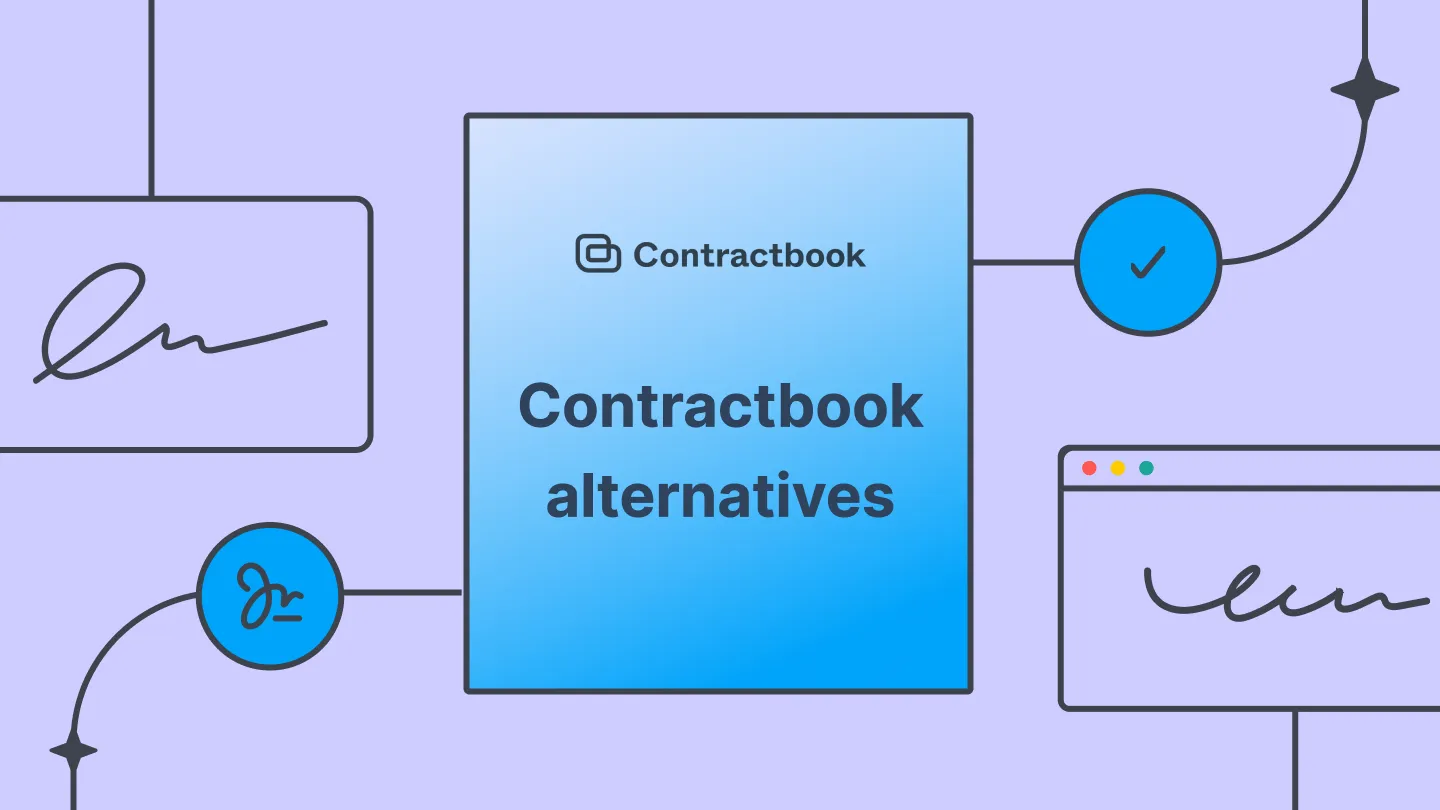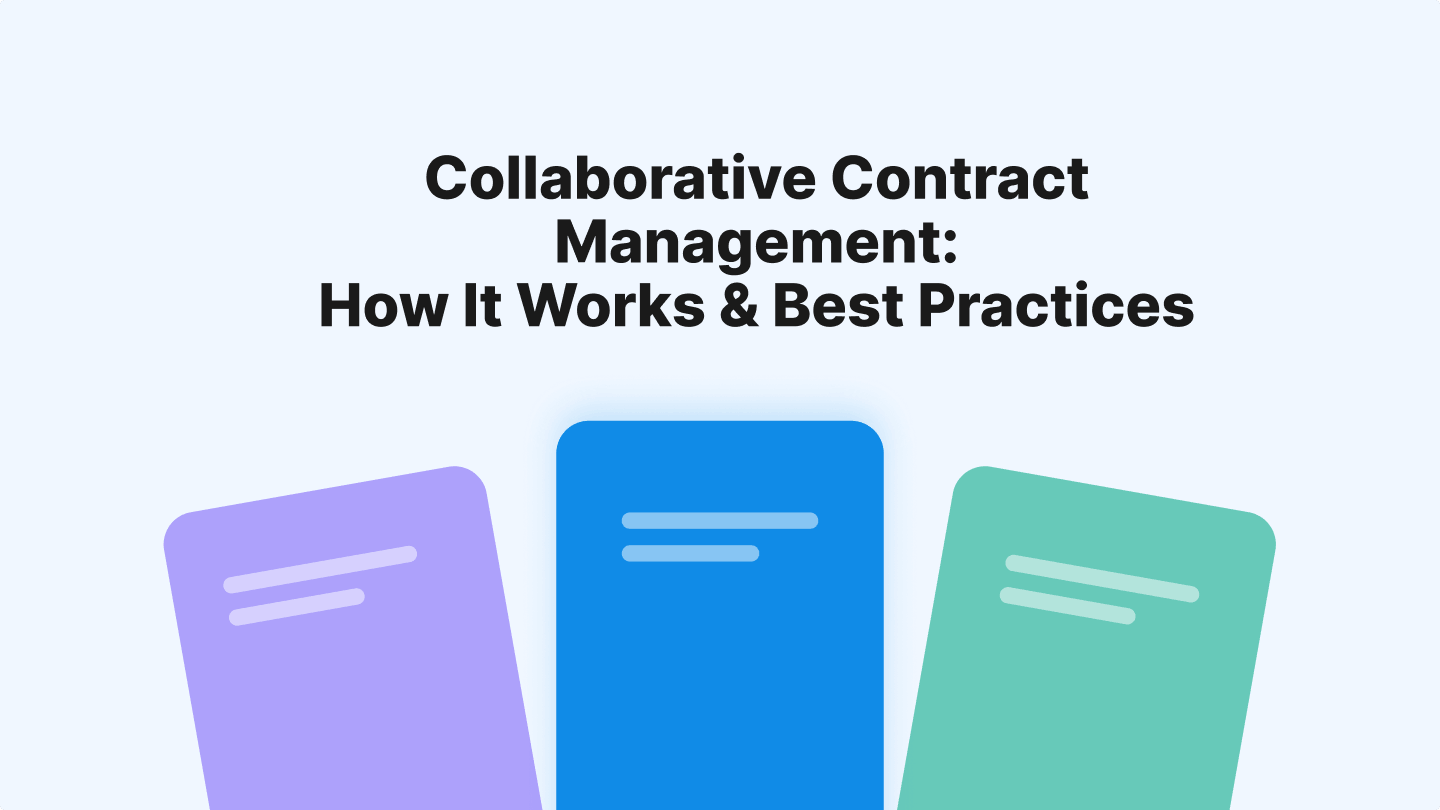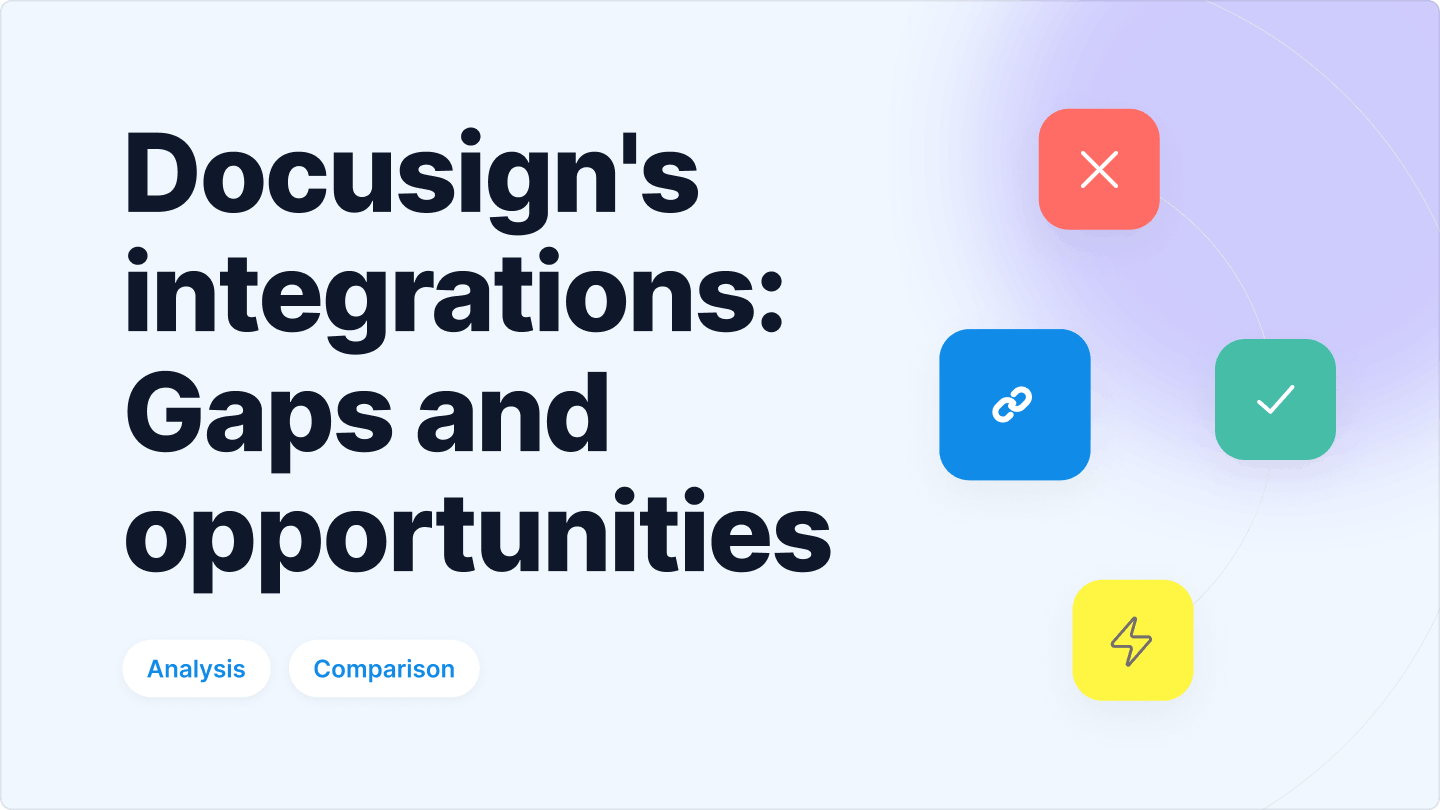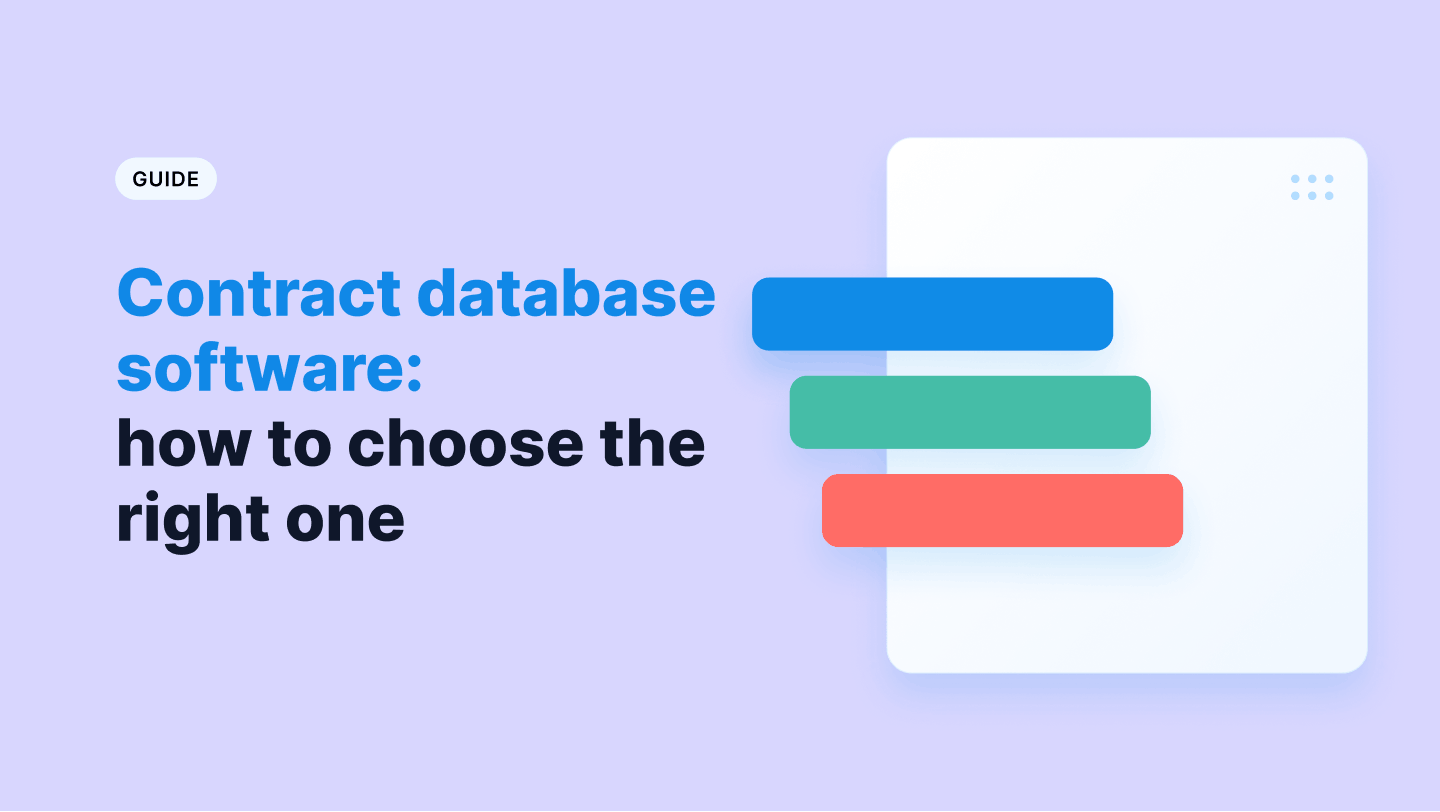For some teams, Contractbook is a no-brainer:

But for others, the experience is quite the opposite:
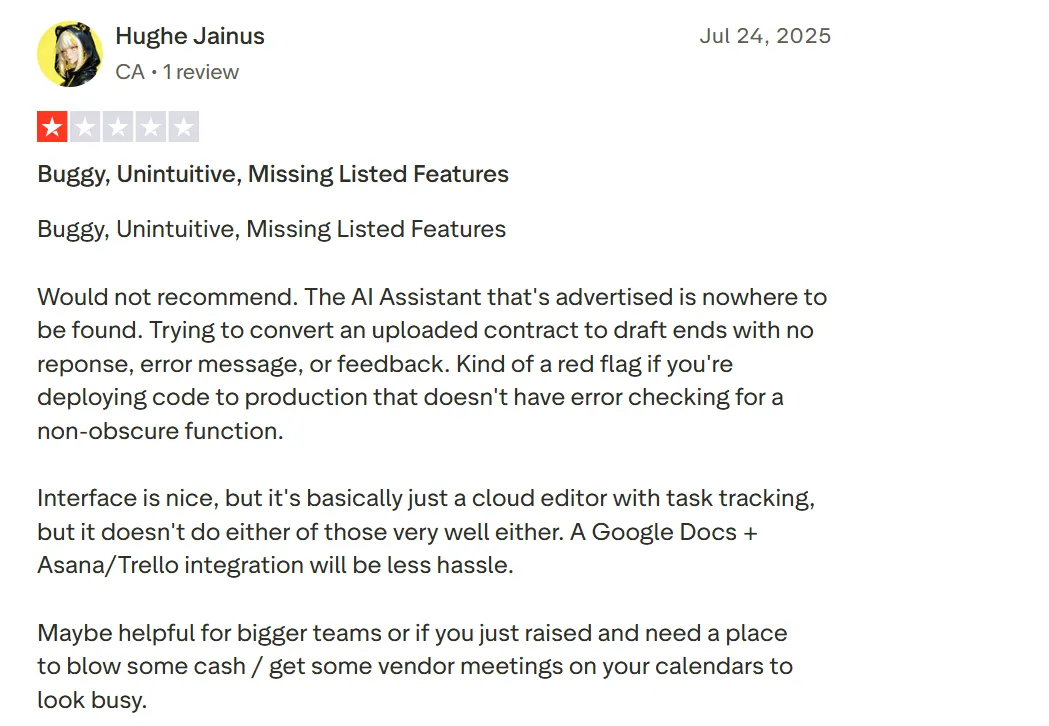
Accounting firm automates workflows with Contractbook
That split leaves growing teams wondering if Contractbook can really scale with them. This begs the question: when teams outgrow Contractbook or don’t find it reliable enough, what alternative should they migrate to?
In this blog, we break down the top Contractbook alternatives with:
- Clear pricing comparisons for each platform
- Use cases and best-fit team sizes
- Feature-by-feature and integration insights
- A quick Contractbook vs. Signeasy head-to-head comparison
Let’s start with a quick look at the platform itself. Helpful if you’re weighing it against other options.
What is Contractbook?
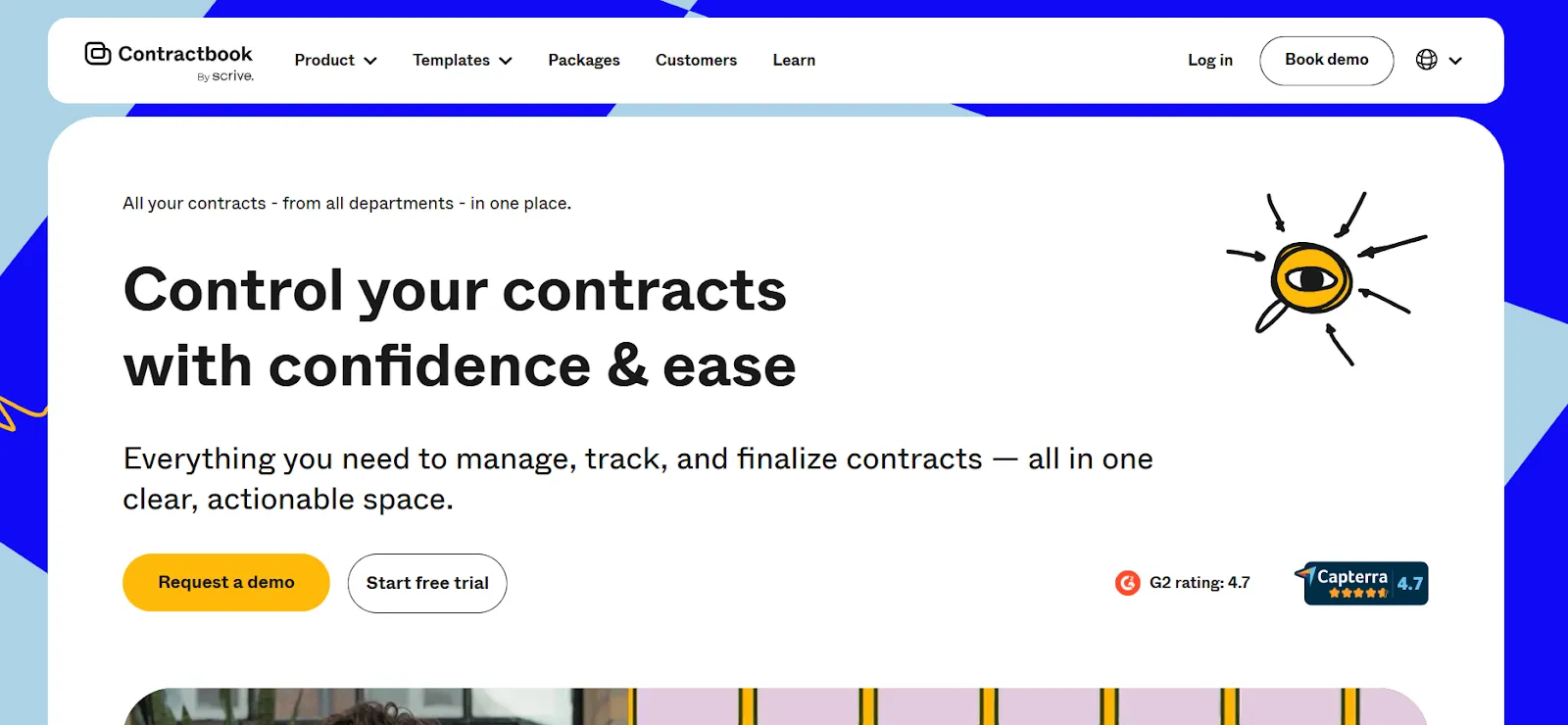
Contractbook is a contract lifecycle management (CLM) platform that combines eSignatures, contract templates, workflow automation, and a searchable document repository in one tool. Its goal is to help businesses move away from scattered files and manual processes by centralizing contract creation, signing, and storage.
The platform is most popular with small to mid-sized companies, especially teams that don’t have a large in-house legal function. It’s popular among sales, HR, and operations teams for handling NDAs, vendor, and employment contracts, though the 500-contract cap can limit scalability.
However, many teams start looking for Contractbook alternatives for three main reasons.
- First, Contractbook does not disclose its pricing publicly, which creates uncertainty during budget planning.
- Second, the platform lacks a mobile app for on-the-go contract management.
- Most importantly, even Contractbook's top tier limits users to 500 completed contracts per year.
Businesses with high contract volumes or plans for rapid scaling quickly hit this ceiling. Alternatives like Signeasy remove this restriction entirely with unlimited signing at flat monthly rates.
Features to consider when choosing a Contractbook alternative
As you compare Contractbook with other tools, pay attention to how each handles key functions like automation, collaboration, and visibility.
These categories show what to prioritize when assessing better-fitting options.
1. Core contract lifecycle needs
Look for tools that support full authoring and editing like clause libraries, Word plug-ins, and version control. Redlining and collaboration features are essential too, whether through in-browser editing or tracked changes in Word.

Source
Workflow automation is another key piece — think conditional approvals, reminders, and obligation tracking.
2. Repository and search
A good repository does more than just store contracts. Smart metadata, OCR scanning, and full-text search make finding what you need effortless. Built-in retention policies handle compliance automatically.

Source
3. Security and compliance
Ensure the vendor meets enterprise standards like 21 CFR Part 11, SOC 2 Type II, ISO 27001, and GDPR. SSO/SCIM, detailed audit trails, and regional data residency are must-haves for sensitive agreements.
4. Integrations and extensibility
Contractbook competitors vary widely in their integrations. Prioritize CRM (Salesforce, HubSpot), CPQ, ERP, HRIS, and storage systems. Also, check API depth, rate limits, SDKs, and webhook support, as they are all important for scalability.

Source
5. AI capabilities
Modern platforms offer AI that suggests clauses, flags risks, auto-tags documents, and extracts data into structured fields. These features save time and reduce manual review.

Source
6. Pricing and total cost
Compare seat-based vs. document-based pricing, and factor in implementation or support costs. Transparent models make long-term planning easier.
7. Adoption and change management
Prioritize tools with a clean interface, strong mobile support, and straightforward admin controls. Training materials and customer success programs also make rollout smoother and reduce resistance to change.

Source
These factors shaped our selection of the leading alternatives below.
The 10 best Contractbook alternatives (editor’s picks)
Dozens of platforms compete with Contractbook, but a handful consistently stand out. These tools cover different use cases — from lightweight eSign to enterprise-level CLM — so you can quickly identify which fits your requirements.
How we sourced our data
To provide accurate recommendations, we reviewed official product documentation, pricing pages, and feature overviews from each vendor. We also looked at independent reviews and industry case studies, validating claims through hands-on exploration.
Our evaluation focused on ease of implementation, pricing transparency, scalability, and compliance. This approach is designed to save you hours of research and point you toward the right solution for your business needs.
Below is a quick snapshot of the top five Contractbook alternatives before we dive into full reviews.
Leading our detailed reviews is the solution that delivers the best combination of features and usability.
1. Signeasy
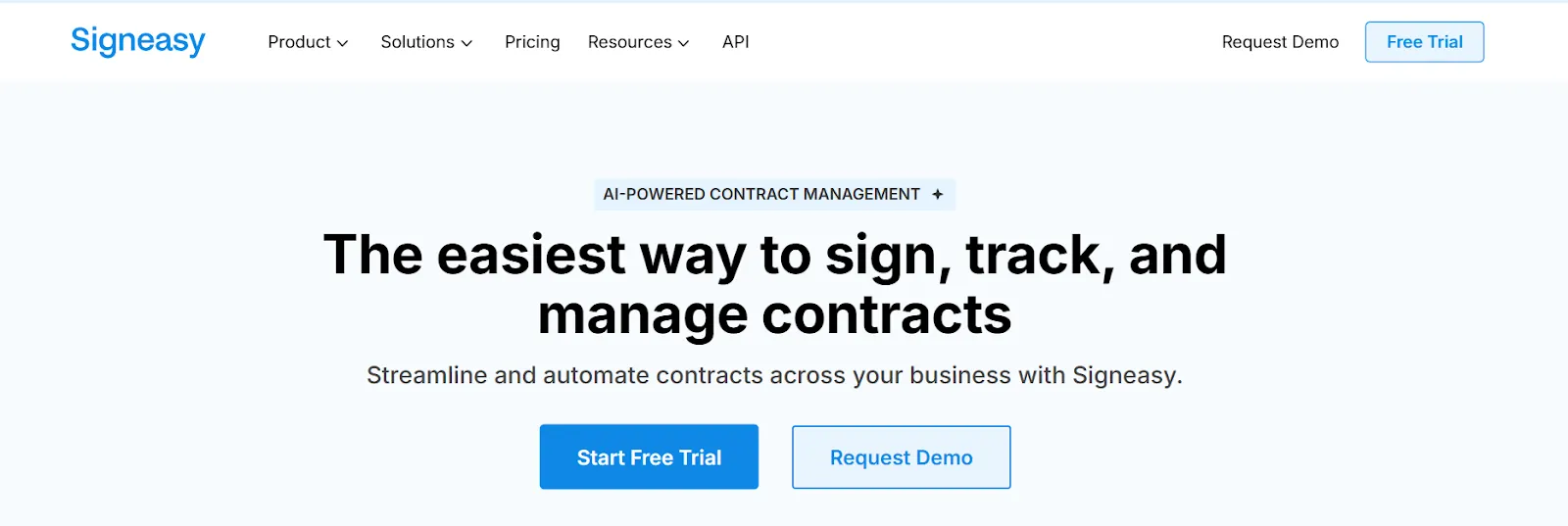
Top on the list is Signeasy. It’s a strong fit for small to mid-sized businesses looking for speed and simplicity in eSignatures. On top of that, it brings in AI-powered workflows, generous signing limits, and enterprise-level compliance for growing teams.
Designed for teams that value simplicity without sacrificing control, Signeasy delivers immediate productivity from day one. It eliminates lengthy onboarding or complex configurations, letting users send, sign, and manage contracts effortlessly.
For teams comparing Contractbook alternatives, it offers one of the quickest paths to measurable value.
Signeasy’s use cases
Signeasy is ideal for: finance approvals, HR onboarding, sales contracts, legal agreements, vendor procurement, IT service contracts, and operational workflows across all departments.
Signeasy’s standout features
1. Effortless eSignatures: Upload contracts in any format (PDF, Word, etc.) and sign using a click, typed name, or drawn signature. Signeasy supports both individual and multi-party signing, sequential or parallel, for faster turnaround across teams.
2. Smart automation and reminders: Automate follow-ups with reminders, due dates, and alerts. You can also edit signer details or recipients even after sending, keeping workflows flexible without breaking the audit trail.
3. Centralized document management: Store all contracts in a secure, searchable repository. Real-time status updates and email notifications ensure you always know when a document is sent, viewed, or signed.
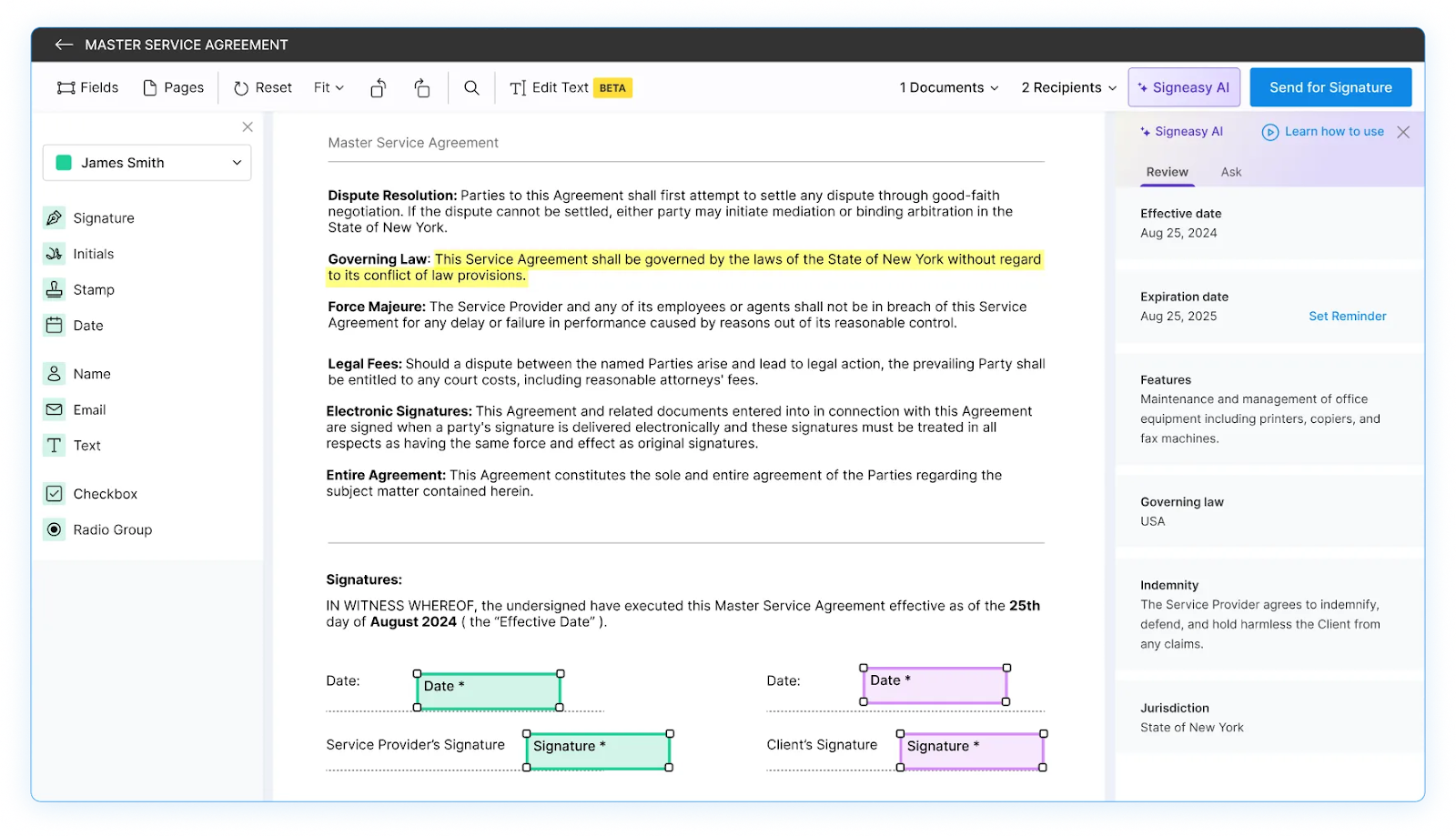
4. Team collaboration and roles: Add team members, set access levels, and control who can send, sign, or view contracts. Role-based permissions make it easy to manage approvals across departments.
5. AI-powered contract intelligence: Use Signeasy’s built-in AI assistant to summarize contracts, extract key terms, or answer quick questions like “When does this expire?”—saving time on manual review.
6. Intelligent contract repository: Centralize every agreement in an AI-powered repository that auto-tags key details, enables fast clause and date searches, and sends timely alerts for renewals and milestones.
Signeasy’s pros
- Unlimited document signing included in paid plans, suitable for teams handling high contract volumes
- Real-time status tracking and automated reminders that simplify contract follow-ups
- Intelligent contract repository offering centralized storage, smart search, and renewal alerts
- Simple, intuitive interface that enables quick onboarding with minimal setup effort
- Transparent per-user pricing that delivers strong value for mid-sized businesses
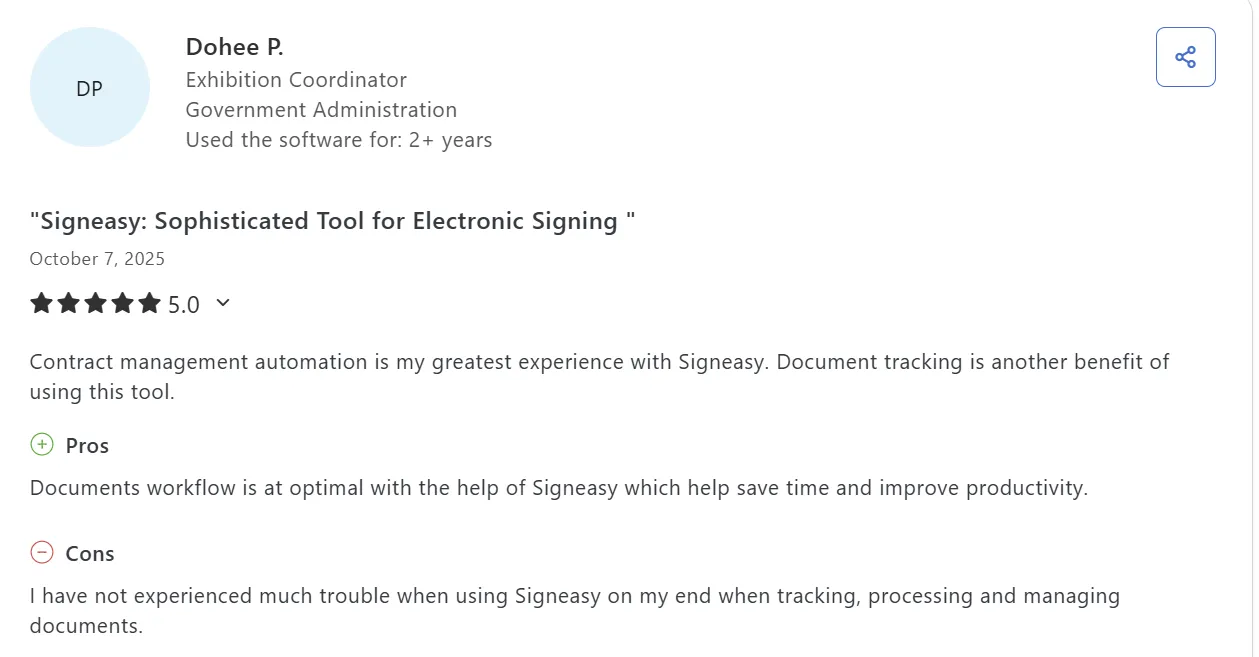
Source
Signeasy’s cons
- The free plan is best seen as a starter tier; upgrading is worthwhile once teams need automation, templates, or integrations.
- Refuses duplicate document titles, requiring manual renaming even for updated versions
Signeasy’s pricing
Signeasy’s plans are structured to meet teams where they are — from individuals getting started with eSignatures to growing businesses building full contract workflows.
- Personal — $10/month (1 seat, billed yearly at $120)
For individuals and sole proprietors with simple eSignature needs.
Includes:
- Unlimited document signing
- Send up to 5 contracts for signature each month
- Mobile signing on iPhone, iPad, and Android
- Execute contracts directly from Google Workspace and Microsoft apps
- Tamper-proof trust seal for every completed document
Best for freelancers and professionals who want reliable, secure eSignatures without complex setup.
- Business — $20/user/month (billed yearly at $240)
Built for growing teams that need to send, sign, and collaborate efficiently.
Includes everything in Personal, plus:
- Unlimited document sending
- Team collaboration with shared templates
- Automated reminders for timely follow-ups
- Admin dashboard for managing users and billing
- AI-based contract extraction and key-term summaries
- Sync contracts to Google Drive or OneDrive Personal
- Two-factor authentication for secure access
- 24/7 email support
Ideal for SMBs ready to scale their document workflows with automation and team visibility.
- Business Pro — $30/user/month (billed yearly at $360)
Designed for organizations managing complete contract lifecycles.
Includes everything in Business, plus:
- Role-based permissions and advanced team visibility
- Usage tracking and performance insights
- Supporting document requests from signers
- 2FA for signers and enhanced access control
- SharePoint and HubSpot integrations
- OneDrive for Business sync
- Priority 24/7 support
- SMS sending (add-on option)
Suited for mid-sized businesses that want end-to-end control and compliance-ready contract management.
- Build Your Plan — Custom Pricing (10+ seats)
For enterprises and teams with advanced security or compliance needs.
Includes:
- Tailored pricing for high-volume and non-profit use cases
- Single Sign-On (SSO) for secure enterprise access
- HIPAA compliance for healthcare teams
- FDA 21 CFR Part 11 compliance (NEW)
- Assisted onboarding with a dedicated Success Manager
- Bulk sending and automated contract workflows (NEW / COMING SOON)
Best for enterprises that need configurable, secure, and scalable eSignature solutions.

All plans include mobile apps and integrations with Google Workspace, Microsoft, and popular CRMs. Yearly billing saves 33%, and enterprise customers get custom pricing with SSO, HIPAA compliance, and dedicated support.
Signeasy’s integration and security
Signeasy integrates seamlessly with essential business tools like Drive, Outlook, Formstack, SharePoint, and HubSpot. Security is enterprise-grade with SSO, comprehensive audit trails, and certifications including GDPR, 21 CFR Part 11, and SOC 2 Type II compliance.
2. Docusign

Docusign holds significant market share in the global eSignature space, with widespread adoption across enterprises that require proven reliability and regulatory compliance. The platform has become a standard choice in many industries, particularly among organizations operating internationally and needing signing solutions recognized across multiple jurisdictions.
Teams evaluating Contractbook competitors often include Docusign when brand trust and established security certifications are top priorities.
Docusign’s use cases
Ideal for legal, financial, and procurement teams in large organizations that require advanced compliance, regulated workflows, and scalable global eSignature adoption.
Docusign’s standout features
- eSignature tools with support for multiple authentication methods
- Workflow automation for routing, approvals, and document tracking
- Template library for recurring agreements
- Admin controls for managing teams and permissions
- Industry-specific compliance support, including finance and healthcare
Docusign’s pros
- Broad global adoption with a high level of trust across industries
- Strong template and workflow functionality for recurring use cases
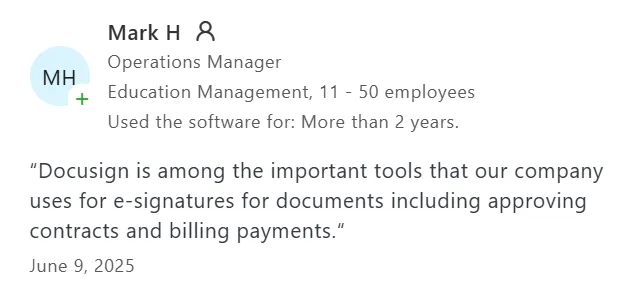
Source
- Extensive compliance certifications covering multiple jurisdictions
- Wide range of integrations with CRM, ERP, and productivity tools
Docusign’s cons
- Essential features are only available on the most expensive plans
- Per-user pricing charges for every seat regardless of usage frequency
Docusign’s pricing snapshot
Docusign offers a 30-day free trial with no credit card required. Docusign pricing begins at $10/month for individuals (limited to 5 envelopes) and scales to $25-40 per user monthly for teams, with strict yearly envelope caps of 100 per user.
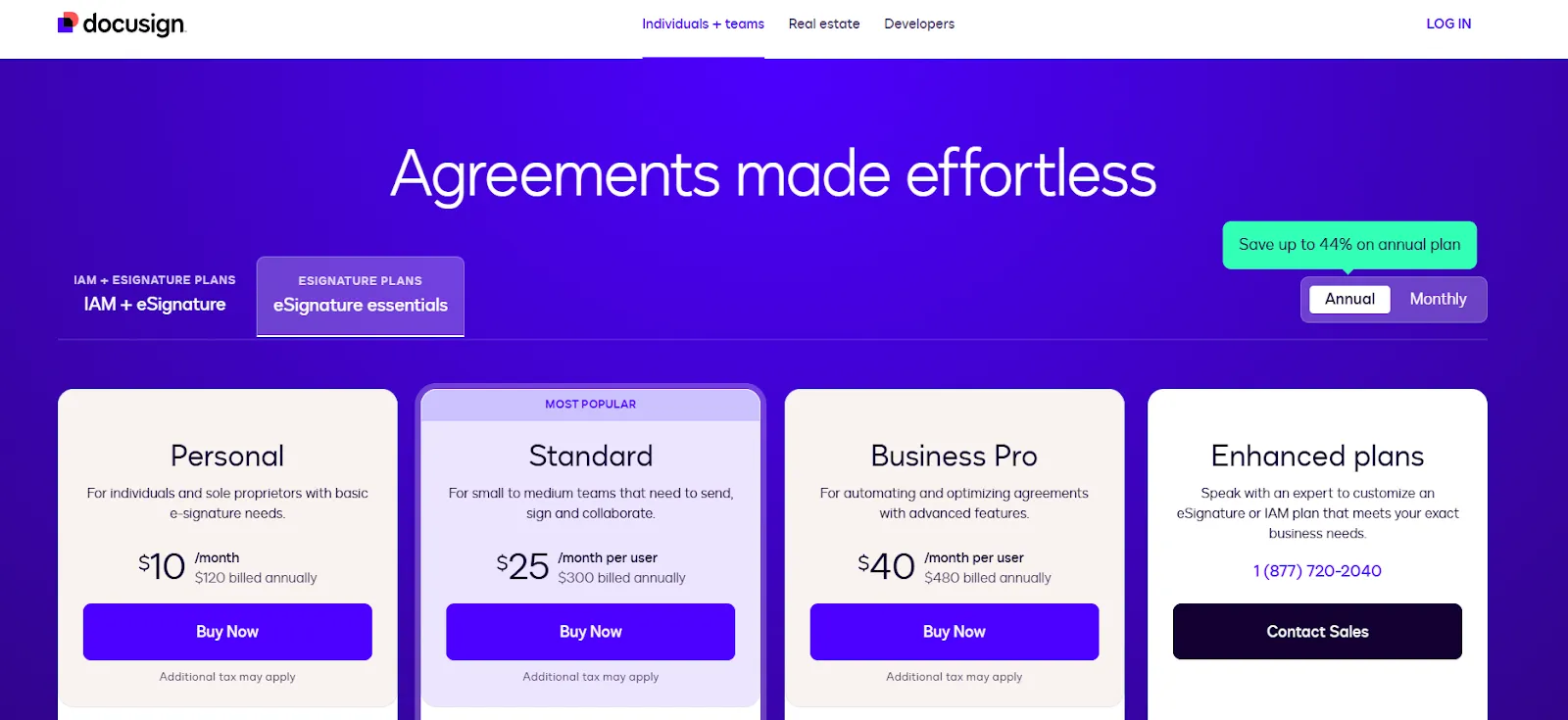
Annual billing discounts reach 44%, but the per-user structure means paying for inactive seats. Enterprise customers get unlimited envelopes and premium support through custom pricing that often exceeds simpler Contractbook alternatives.
Docusign’s integrations and security
Integrates with Salesforce, Microsoft, Google Workspace, and multiple business apps. Security includes SOC 2 Type II, ISO 27001, GDPR compliance, SSO, and advanced audit trails.
3. PandaDoc

PandaDoc is a document automation platform built for sales and revenue teams that need to create, send, and manage proposals, quotes, and contracts in one place. Teams consider it as a Contractbook alternative when they need eSignatures integrated directly with their sales pipeline, especially for generating quotes and collecting payments.
PandaDoc’s use cases
Best suited for sales, marketing, and customer success teams that want to combine document creation, eSignatures, and payments into one workflow.
PandaDoc’s standout features
- Content library for reusable proposals and templates
- Interactive pricing tables with product catalogs and discounts
- Built-in payment collection for faster deal closing
- Real-time collaboration with comments and approvals
- Analytics to track document views and engagement
PandaDoc’s pros
- Strong fit for sales-led teams managing proposals and quotes

Source
- Built-in payments streamline closing processes
- Intuitive drag-and-drop editor for fast document creation
- Provides detailed insights into recipient engagement
PandaDoc’s cons
- Focused more on sales and revenue use cases than full-scale CLM
- Customer service has slowly deteriorated over time according to long-term customers
PandaDoc’s pricing snapshot
PandaDoc offers four pricing tiers:
- Starter ($19/seat/month, unlimited docs and eSignatures),
- Business ($49/seat/month with CRM integrations and workflows), and
- Enterprise (custom pricing with CPQ and automation).
Smaller teams with simpler eSignature requirements can opt for the free plan.
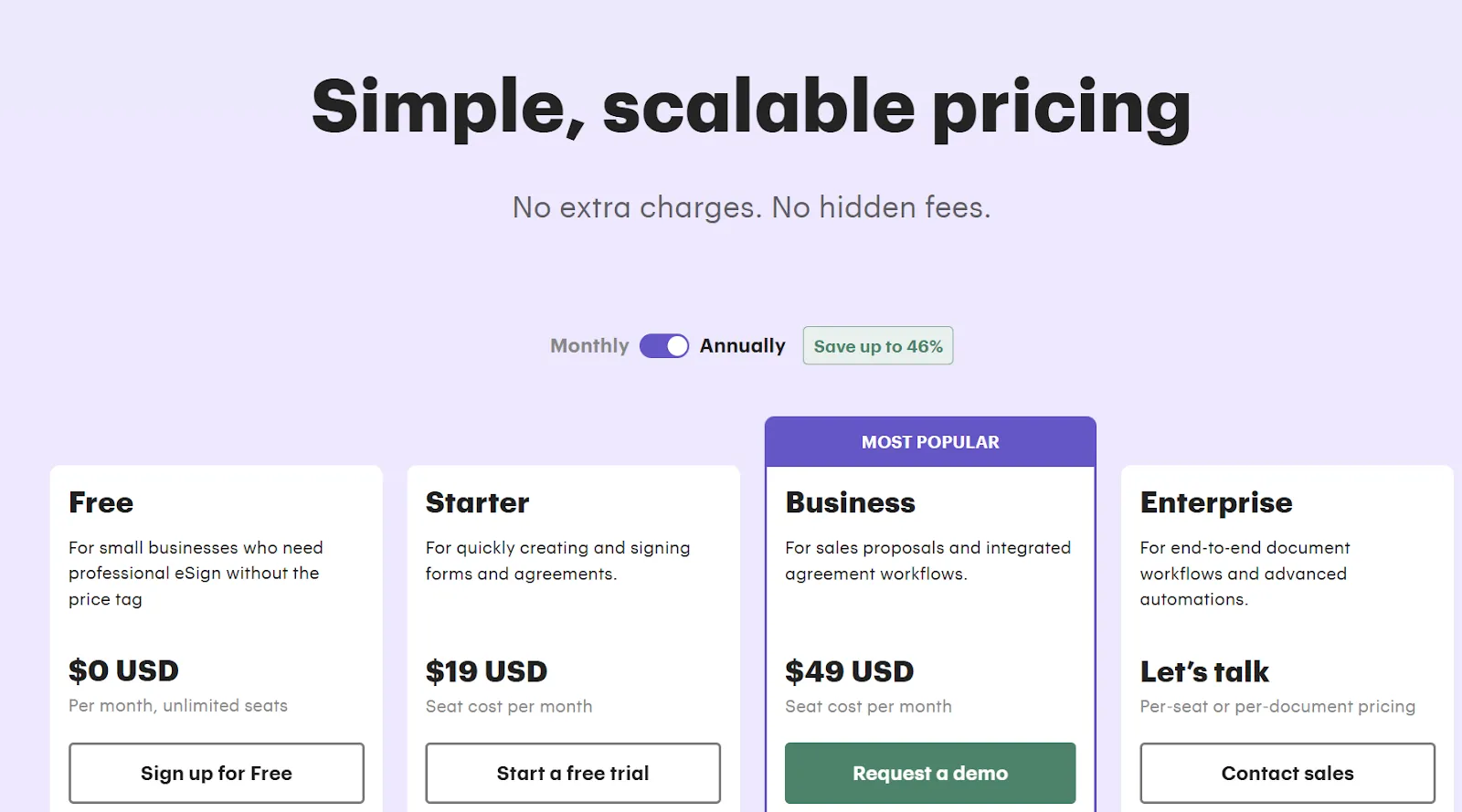
Annual billing saves up to 46%. The Launch plan's pay-per-document model suits low-volume users, while per-seat plans can become expensive for larger teams needing advanced sales features.
PandaDoc’s integrations and security
Integrates with Salesforce, HubSpot, Zoho CRM, and payment platforms like Stripe and PayPal. Security includes GDPR compliance, audit trails, and SOC 2 Type II certification.
4. Ironclad

Ironclad serves legal departments and enterprise teams that manage high-volume contract portfolios with complex approval chains. The platform focuses heavily on workflow customization, negotiation playbooks, and analytics dashboards that surface contract performance and risk patterns.
Organizations typically turn to Ironclad after outgrowing basic CLM tools, when they need sophisticated governance controls and deeper visibility into their contract lifecycle.
Ironclad’s use cases
Ideal for enterprises and legal departments managing high contract volumes, regulatory requirements, and complex approval workflows.
Ironclad’s standout features
- Workflow designer to automate complex approval paths
- Playbooks for standardized negotiation and compliance guardrails
- In-browser redlining with version tracking and audit trails
- AI-driven contract data extraction and clause recognition
- Analytics for contract performance and risk insights
Ironclad’s pros
- Highly configurable workflows tailored to enterprise processes
- Strong negotiation tools that support legal-led teams

Source
- Analytics dashboards provide visibility into contract lifecycles
- Playbooks reduce risk and maintain compliance across deals
Ironclad’s cons
- Implementation can be lengthy (weeks to months) and often demands technical or legal ops expertise.
- AI features may not always hit expectations — frequently requiring manual review, especially for complex or nonstandard contracts.
- The absence of a publicly advertised free trial means many organizations must plan pilots or negotiate demos.
Ironclad’s pricing snapshot
Ironclad doesn't publish standard pricing and requires custom quotes through sales consultations.

The platform offers modular solutions that businesses can combine based on their needs, including AI-powered legacy agreement analysis, contract lifecycle management, eSignature capabilities, and cross-platform tracking.
Pricing might vary depending on selected products, deployment approach, integrations, and support level. You can read Ironclad pricing here.
Ironclad’s integrations and security
Ironclad integrates with Salesforce, Google Drive, Docusign, and Microsoft 365. Security certifications include SOC 2 Type II, GDPR compliance, and enterprise SSO/SCIM support.
5. Juro
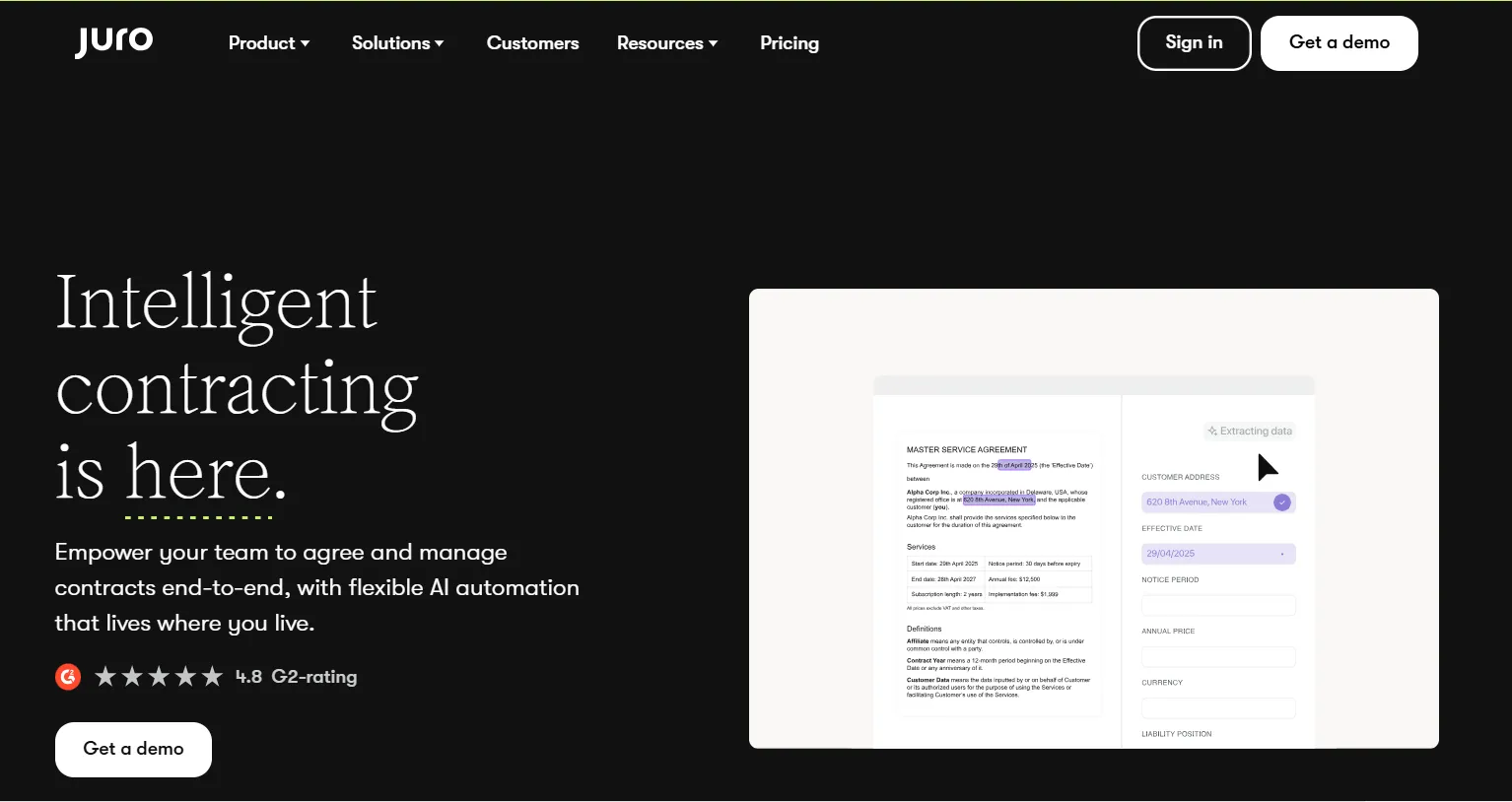
Juro focuses on browser-native contract management where teams draft, negotiate, and collaborate without switching between applications.
The platform structures contracts as queryable metadata rather than static documents, which improves reporting and search capabilities. Organizations look at Juro when they want real-time collaboration tools and need better visibility into contract data across their portfolio.
Juro’s use cases
Popular with scaling companies and legal-light teams that prioritize fast, browser-based authoring and want structured data for reporting and compliance.
Juro’s standout features
- In-browser contract editor with real-time collaboration
- Metadata-first contracts that enable advanced search and reporting
- Dashboards for tracking contract progress and obligations
- Templates for recurring agreements with version control
- Built-in negotiation tools for redlining and approval workflows
Juro’s pros
- Browser-native drafting removes the need for Word-based editing

Source
- Metadata approach improves reporting and contract insights
- Streamlined collaboration within the editor reduces email back-and-forth
- Dashboards provide visibility for both legal and business teams
Juro’s cons
- Limited redlining options with only full acceptance or rejection available, no partial redlining capability
- Steep pricing that can be cost-prohibitive for smaller organizations
- Basic search and data extraction capabilities that don't offer the best contract insights
Juro’s pricing snapshot
Juro tailors pricing to business size and requirements, with plans that scale based on users and contract volume.
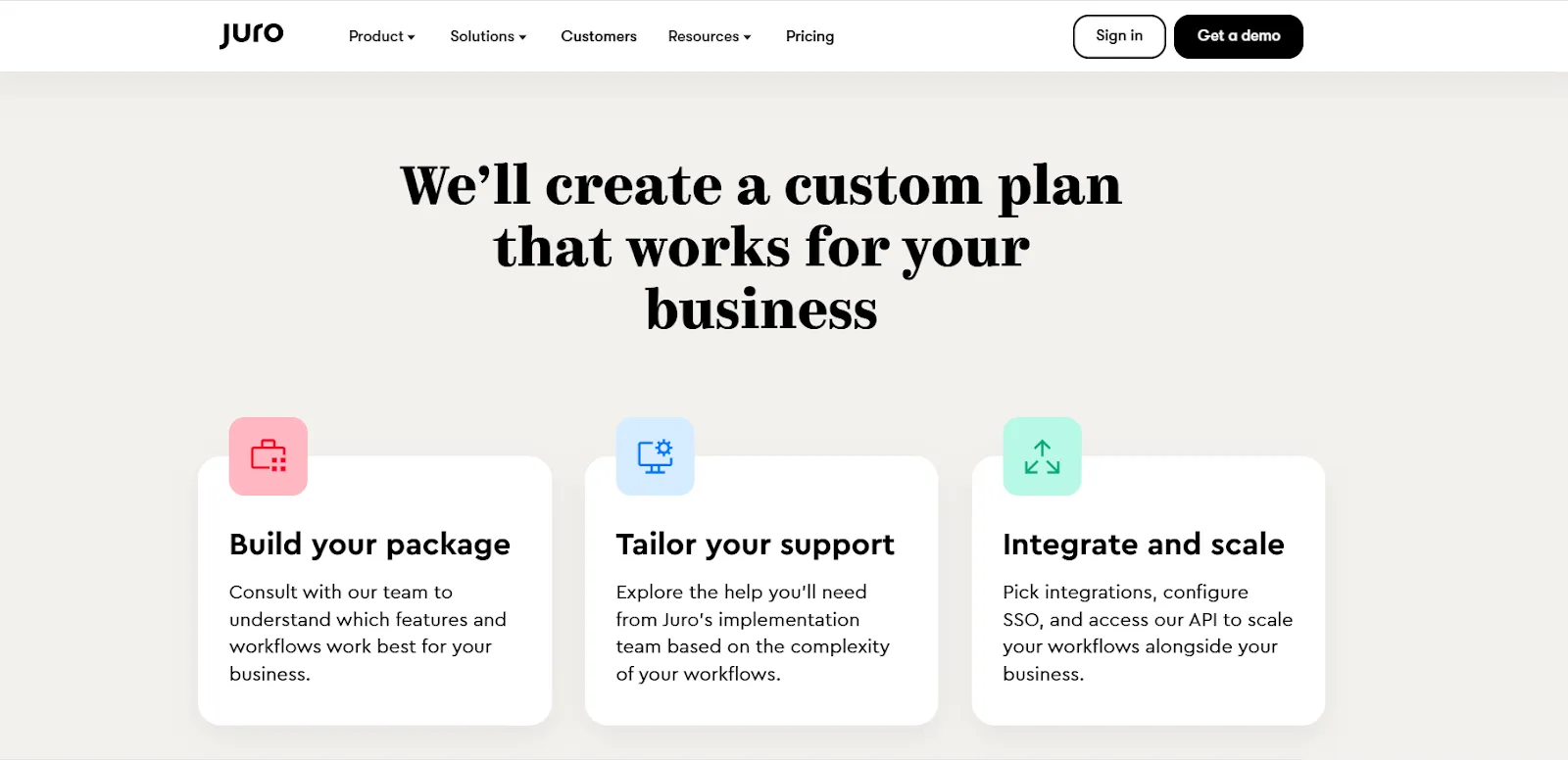
The company does not publish public pricing, so prospects must contact sales for quotes.
Juro’s integrations and security
Integrates with Salesforce, Slack, Greenhouse, and Google Drive. Security includes GDPR compliance, SOC 2 certification, and SSO for enterprise accounts.
6. Concord.app
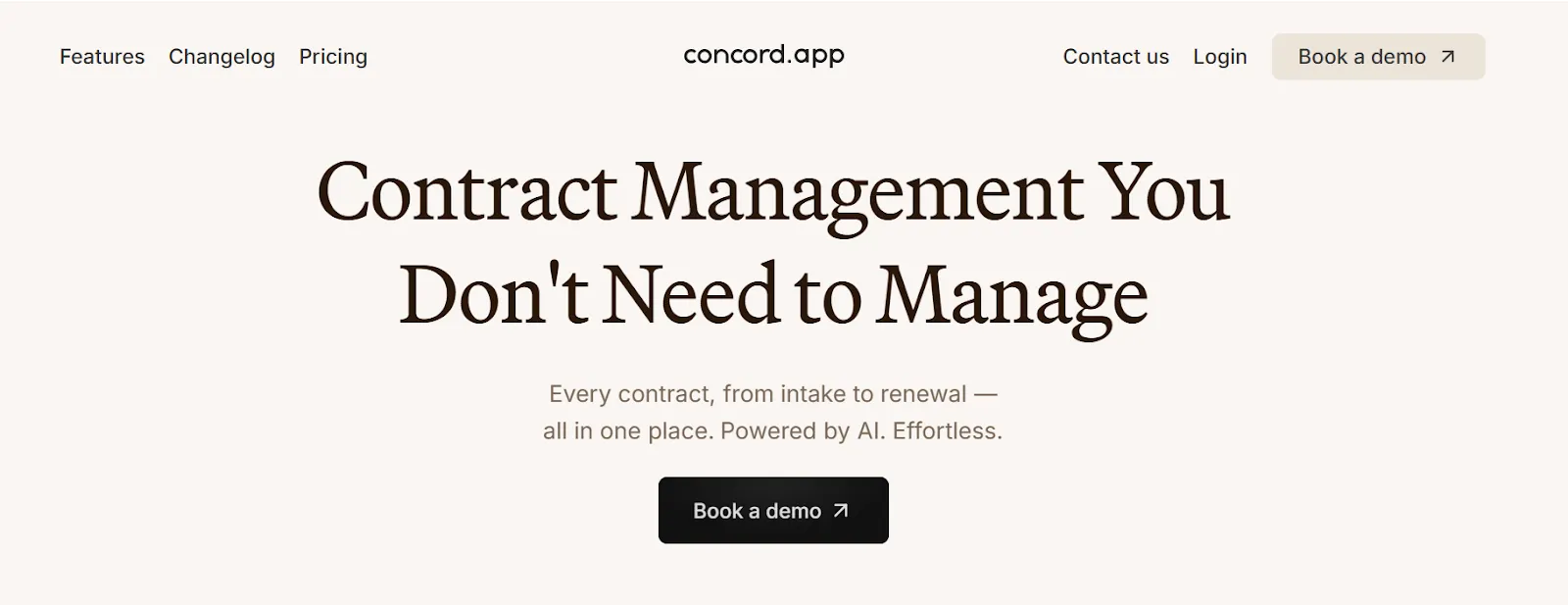
Concord is a contract management platform designed for small to mid-market companies that need accessible CLM basics without heavy implementation. It stands out among Contractbook competitors for offering an all-in-one workflow at an approachable scale.
Concord’s use cases
Best for mid-sized businesses that need an affordable, straightforward tool for contract drafting, signing, and repository management without the complexity of advanced CLM platforms.
Concord’s standout features
- Centralized contract repository with search and version tracking
- Built-in eSignatures across all plans
- Approval workflows and deadline reminders
- Template library for recurring contracts
- Reporting dashboards for tracking status and compliance
Concord’s pros
- Unlimited eSignatures included in every plan
- Repository and search make it easy to manage contract history
- Reminders and approval workflows support compliance
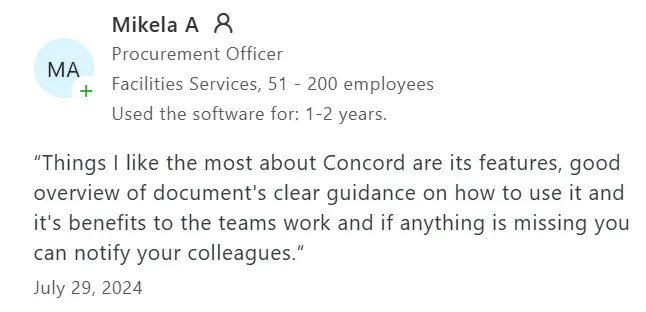
Screenshot of a customer review about the features of Concord
Source
- Simple templates speed up contract creation for non-legal teams
Concord’s cons
- Multiple critical bugs including email mix-ups between clients and colleagues
- Slow customer support response times that can exceed a week
- Cannot create new documents from previously signed contracts
Concord’s pricing snapshot
Concord offers three pricing tiers starting at $499/month (Essentials, 5 users included, additional users $49/month) with unlimited eSignatures and documents. Business plan costs $899/month with approval workflows and integrations, while Enterprise requires custom pricing.
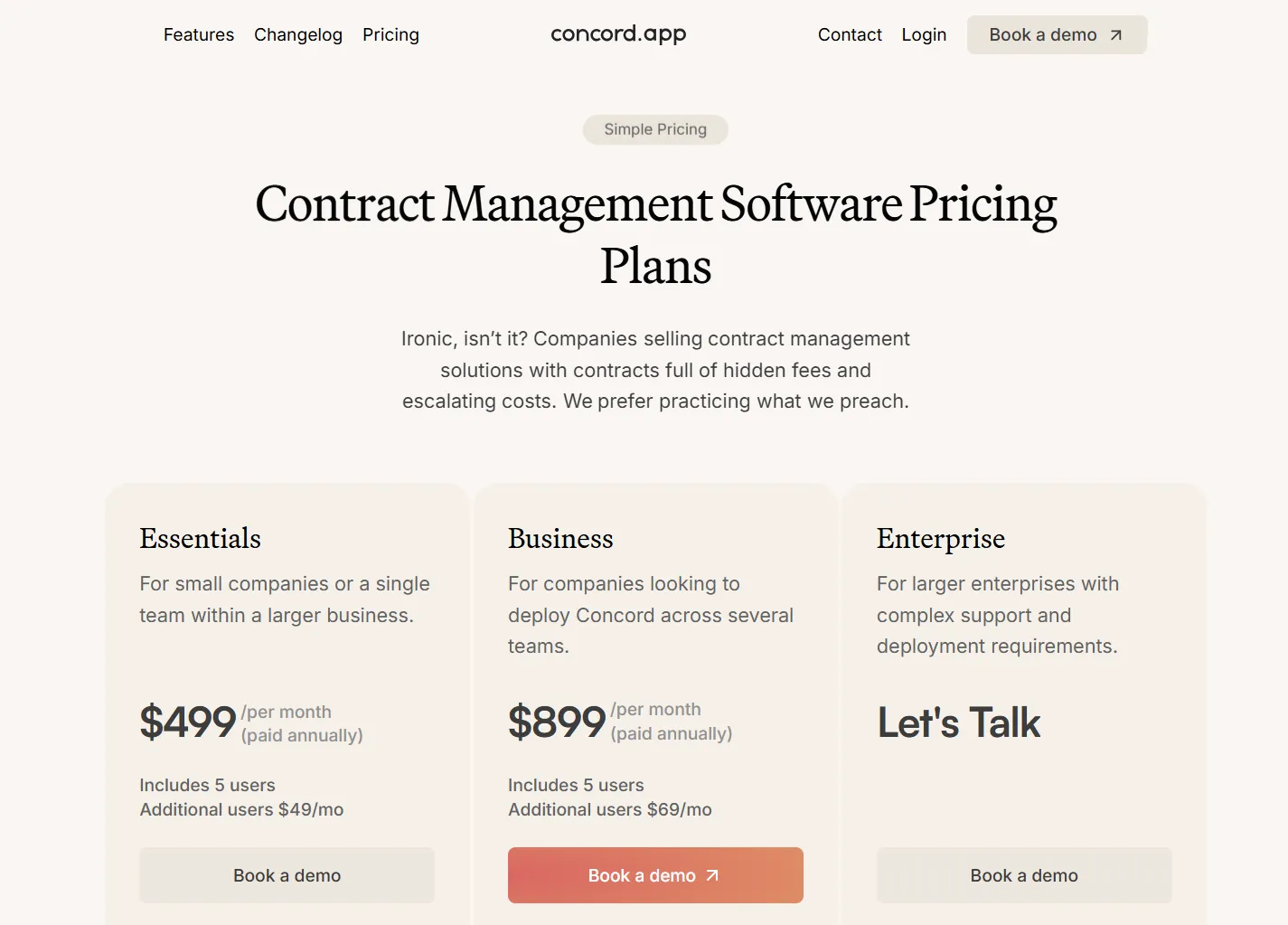
All plans include AI extraction, collaboration tools, and unlimited free viewers. The flat-rate structure with no hidden fees makes it predictable for budgeting compared to per-document competitors.
Concord’s integrations and security
Integrates with Salesforce, Google Drive, Dropbox, and Box. Security includes GDPR compliance, SOC 2 certification, and audit trails.
7. Agiloft

Agiloft is one of the most configurable contract lifecycle management platforms on the market, designed for enterprises that need flexibility. The platform prioritizes customization, automation, and enterprise-grade compliance over the streamlined approach of lightweight Contractbook competitors.
Agiloft’s use cases
Ideal for large enterprises and regulated industries that require highly configurable workflows, detailed compliance reporting, and AI-driven contract insights.
Agiloft’s standout features
- Highly configurable workflow engine with conditional approvals
- Advanced clause and template library for large legal teams
- AI-powered data extraction and risk scoring
- Detailed reporting and analytics dashboards
- Open API with extensive customization options
Agiloft’s pros
- Deep customization of workflows, fields, and reporting
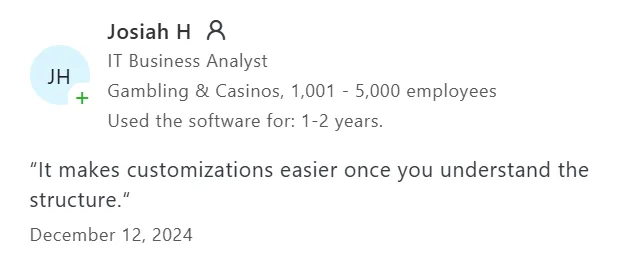
Screenshot of a customer review about Agiloft
Source
- AI-driven insights for risk and compliance management
- Strong support for enterprise security and governance needs
- Scales well across global and complex organizations
Agiloft’s cons
- Complex table structure with many hidden linked tables that make modifications confusing for users
- No dedicated test or sandbox environment — all configuration changes occur directly in production.
Agiloft’s pricing snapshot
Agiloft offers a single comprehensive CLM platform with custom pricing only.

No published rates or tiers are available — all pricing requires direct sales consultation to configure workflows, AI features, and enterprise-grade functionality.
Agiloft’s integrations and security
Agiloft integrates with Salesforce, Oracle, SAP, Microsoft 365, and Slack. Security includes SOC 2 Type II, GDPR compliance, SSO, and role-based access controls.
8. LinkSquares
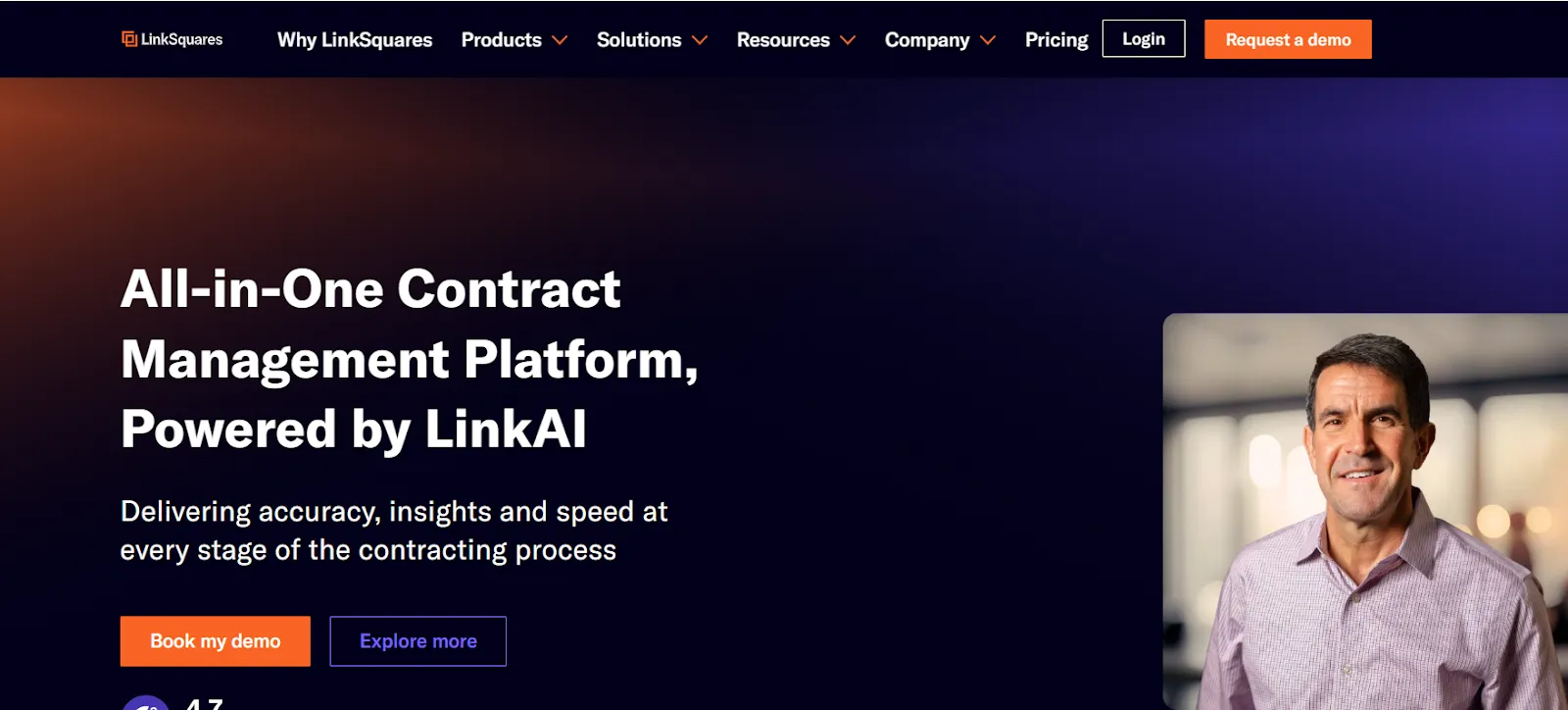
LinkSquares is an AI-driven contract management platform focused on post-signature analysis and reporting. It’s often compared in lists of Contractbook competitors because it emphasizes visibility into existing agreements rather than simply authoring or eSign.
LinkSquares’ use cases
Best for legal, compliance, and finance teams that need advanced insights into existing contracts, especially in industries with strict reporting and audit requirements.
LinkSquares’ standout features
- AI-powered contract analysis for obligations, renewal dates, and risks
- Centralized repository with smart search and tagging
- Customizable dashboards for reporting and KPIs
- Automated alerts for key deadlines and compliance requirements
- Integrations with major CRM and collaboration platforms
LinkSquares’ pros
- Strong AI features for extracting data from signed contracts
- Helps consolidate legacy contracts into a searchable library

Screenshot of a customer review for LinkSquares
Source
- Useful for compliance monitoring and risk management
- Dashboard insights make tracking obligations easier
LinkSquares’ cons
- Unexpected add-on costs for key features presented as standard during sales
- Steep learning curve with cluttered, confusing interface
- The Finalize module cannot process PDFs
- AI analysis is limited to the Analyze module
LinkSquares’ pricing snapshot

Pricing is custom and depends on contract volume and feature needs. Packages typically include repository, analytics, and AI features, with higher tiers adding integrations and advanced reporting.
LinkSquares’ integrations and security
Works with Salesforce, Docusign, Microsoft, Slack, and cloud storage providers. Security includes SOC 2 Type II compliance, GDPR support, and role-based access controls.
9. SpotDraft
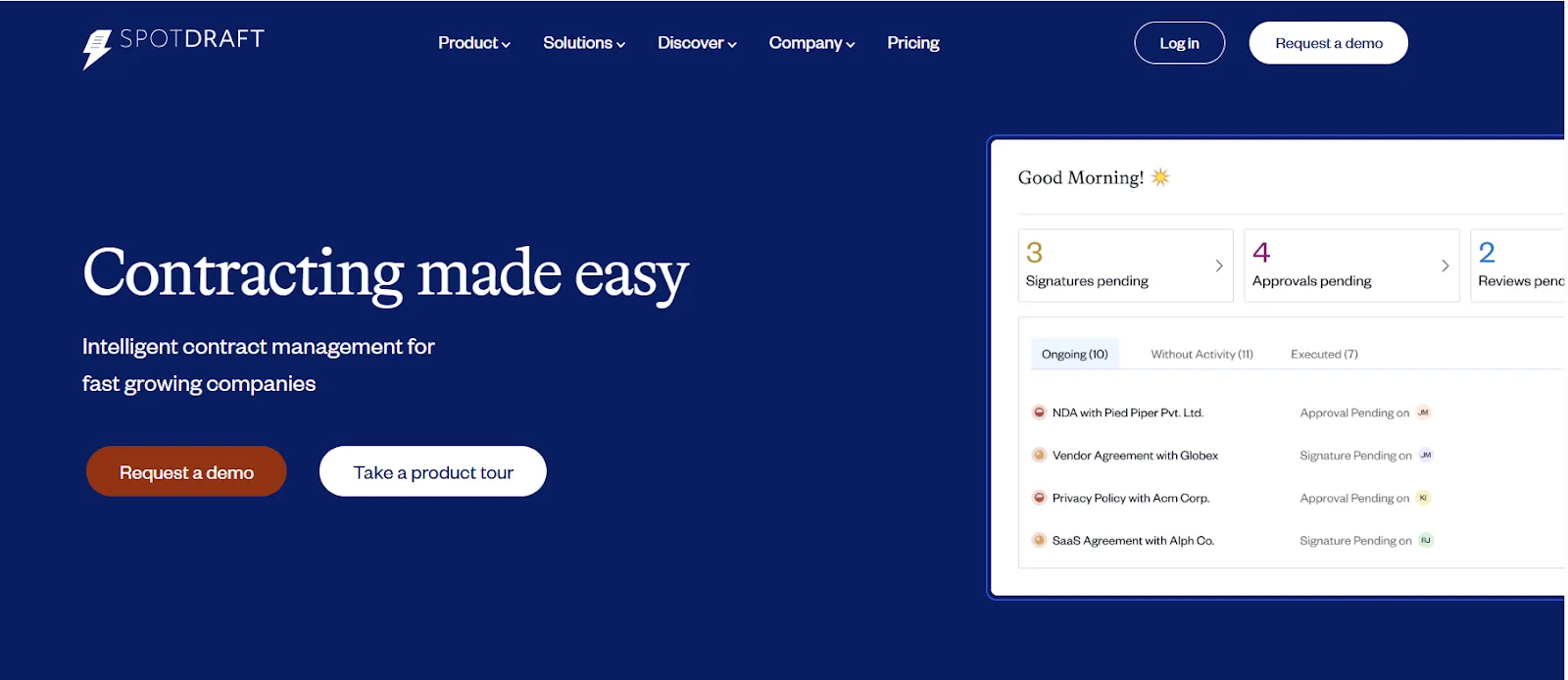
SpotDraft is a contract management platform built for scaling legal teams. The platform combines a modern editor with structured workflows for managing both drafting and approvals among Contractbook alternatives.
SpotDraft’s use cases
A good fit for legal and operations teams in growing companies that want to centralize drafting, automate approval flows, and keep better oversight of contract obligations.
SpotDraft’s standout features
- Browser-based contract editor with clause library
- Workflow automation for reviews and approvals
- AI-assisted data extraction and reminders
- Central repository with search and metadata tagging
- Collaboration tools for internal and external negotiations
SpotDraft’s pros
- Streamlined drafting with reusable templates
- Automated workflows help reduce manual review effort
- Intuitive interface that supports faster adoption across teams

Screenshot of a customer review for SpotDraft
Source
- AI features surface risks and key terms quickly
SpotDraft’s cons
- Limited AI contract review capabilities
- No mobile app available
- Inflexible workflow configurations
SpotDraft’s pricing snapshot
Flexible plans based on users or contract volume.
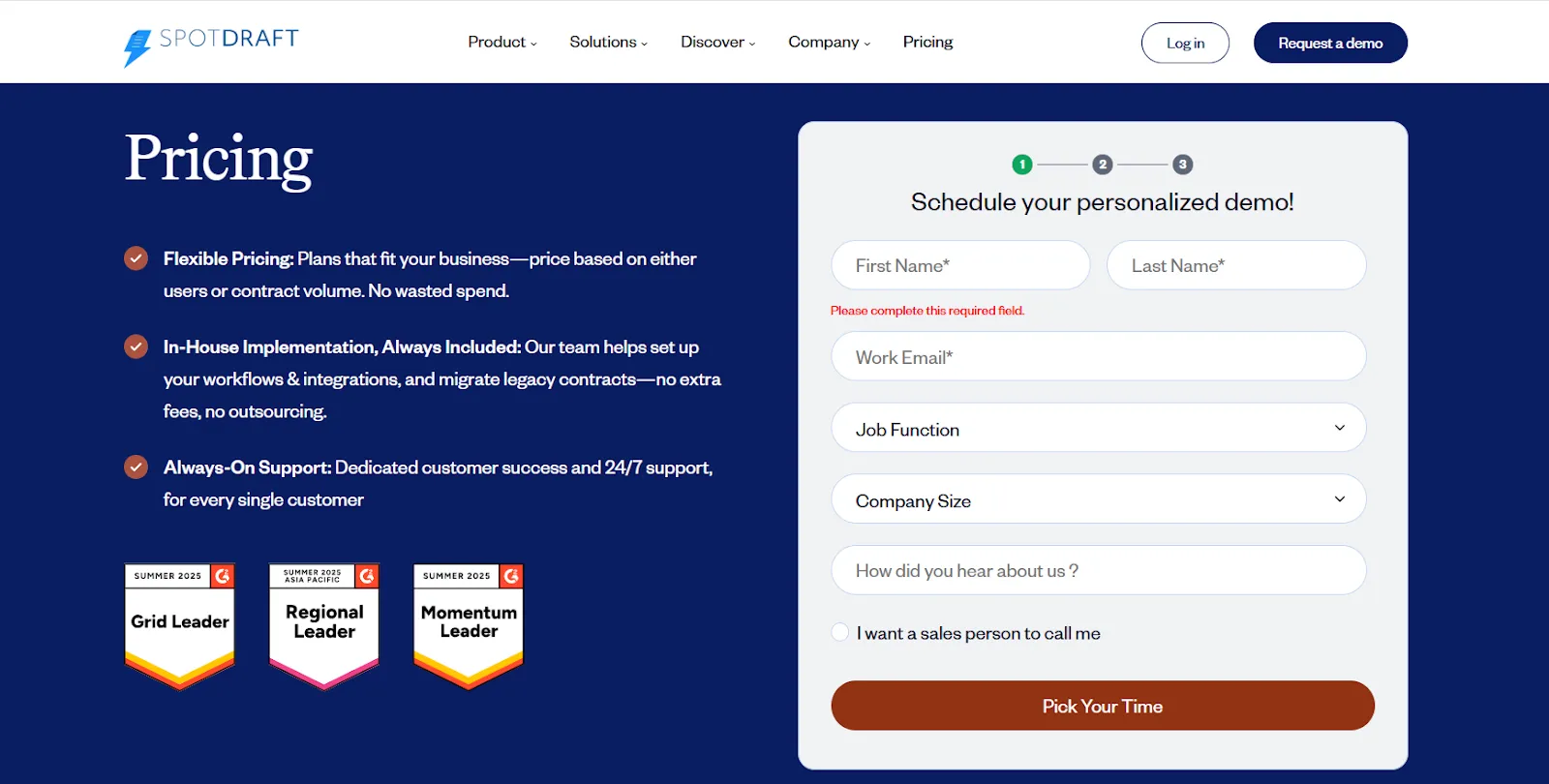
Includes free implementation, workflow setup, legacy contract migration, dedicated customer success, and 24/7 support for all customers.
SpotDraft’s integrations and security
Integrates with Salesforce, HubSpot, Docusign, and Slack. Security coverage includes SOC 2 Type II, GDPR, SSO/SCIM, and detailed audit trails.
10. Conga Contracts

Rounding out our list is Conga Contracts, a contract management platform tailored for Salesforce-centric organizations. It's considered among Contractbook competitors because of its deep alignment with CPQ and sales workflows. For teams already using Salesforce, it provides a more seamless contract lifecycle than Contractbook.
Conga Contracts’ use cases
Ideal for revenue-focused teams, particularly in sales-led organizations, that want contracts tightly integrated with CPQ, quoting, and CRM pipelines.
Conga Contracts’ standout features
- Native Salesforce integration for contract creation and management
- Automated approval routing tied to CRM workflows
- Clause library and template management for consistent authoring
- Advanced reporting and obligation tracking
- Repository with search and audit-ready history
Conga Contracts’ pros
- Strong fit for Salesforce-first organizations

Screenshot of a customer review about Conga Contracts' integration with Salesforce
Source
- Reduces friction between sales and legal through CRM-based workflows
- Comprehensive reporting for contract performance and compliance
- Flexible templates and approval routing options
Conga Contracts’ cons
- Complex setup and steep learning curve for non-technical users
- Clunky UI and slow customer support responsiveness
- High pricing, with customization limited outside the Salesforce environment
Conga Contracts’ pricing snapshot
Pricing is customized based on team size, contract volume, and deployment scope.
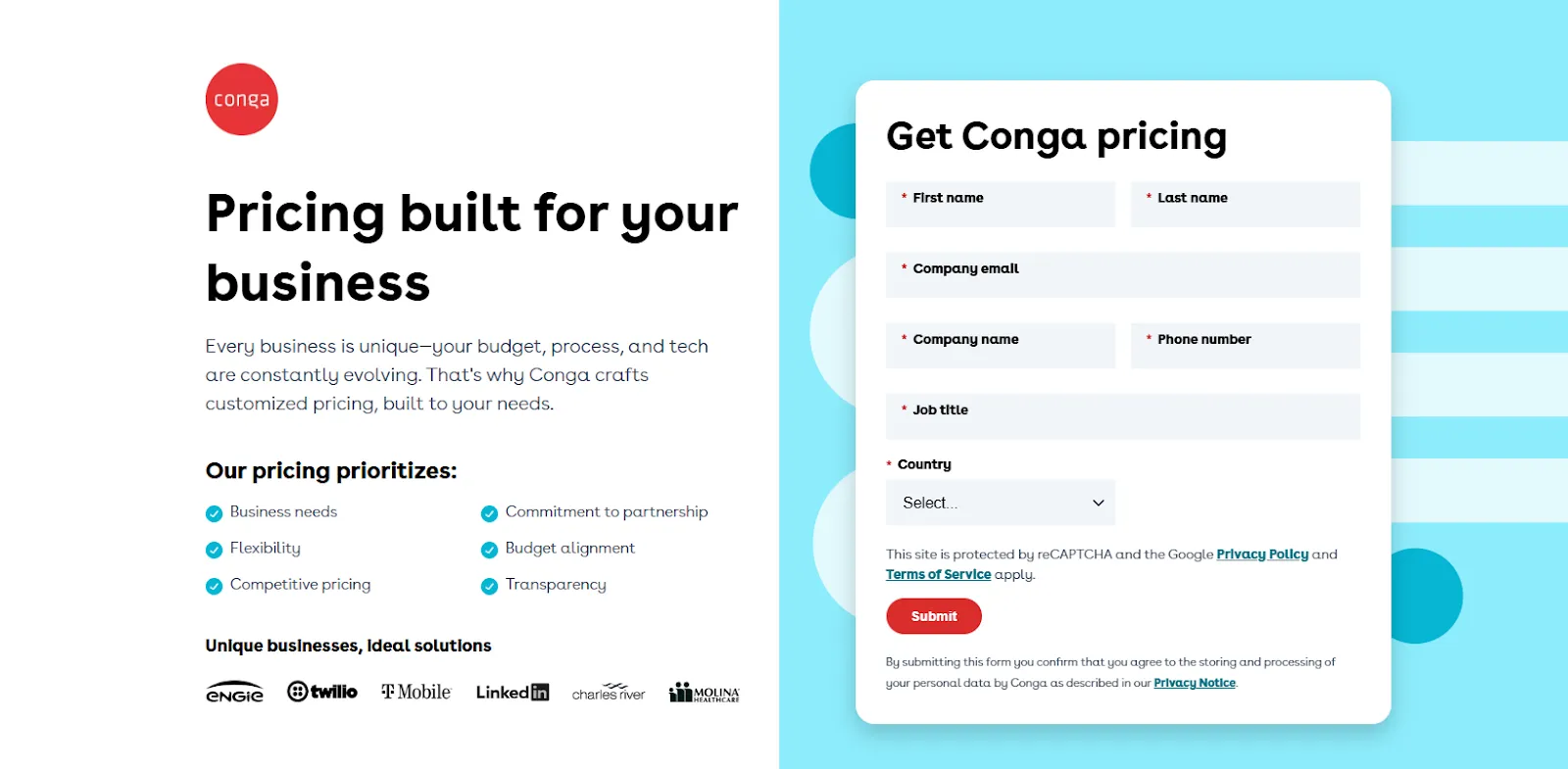
Conga Contracts pricing page
Conga typically serves mid-sized to large enterprises, with costs reflecting its Salesforce alignment and implementation requirements.
Conga Contracts’ integrations and security
Deep Salesforce integration plus connectors for ERP, eSignature, and productivity tools. Security features include SOC 2 compliance, GDPR readiness, role-based access, and audit trails.
Each of these platforms brings unique strengths to contract management, from Docusign's global recognition to Ironclad's enterprise-grade workflows. However, for teams seeking the optimal balance of ease-of-use, comprehensive features, and value, Signeasy is consistently the standout choice.
To illustrate why Signeasy leads the pack, let's examine how it directly compares to Contractbook across the factors that are most essential to growing businesses.
Contractbook vs Signeasy: quick head-to-head
Signeasy consistently appears on shortlists when organizations seek Contractbook alternatives. Both solutions offer contract creation, eSignatures, and workflow automation.
However, their approaches to user experience, scalability, and pricing set them apart for different business needs.
While Contractbook offers more contract lifecycle management (CLM) features, Signeasy delivers faster implementation, better value at scale, and stronger compliance credentials with less complexity.
Implementation and migration (if switching from Contractbook)
Migrating from Contractbook to Signeasy requires strategic planning but rewards teams with faster deployment and immediate productivity gains. Here's your roadmap for migrating with minimal disruption and maximum impact.
- Data export and mapping (templates, fields, tags, users)
Start by extracting your existing contract templates, custom fields, and user data from Contractbook. Signeasy's migration team helps map your template structures and automate user provisioning, preserving critical metadata like tags and approval hierarchies.
Most organizations find their template library transfers seamlessly, with Signeasy's intuitive builder requiring minimal reformatting.
- Pilot workflows and phased rollout
Launch with a small team using your most common contract types — NDAs, service agreements, or employment contracts work well as pilots.
Signeasy's quick setup allows you to test workflows within days rather than weeks. Roll out department by department, utilizing early wins to build momentum across the organization.
- Training, governance, and adoption (roles, audit trails, retention)
Signeasy's interface requires minimal training compared to Contractbook's steeper learning curve.
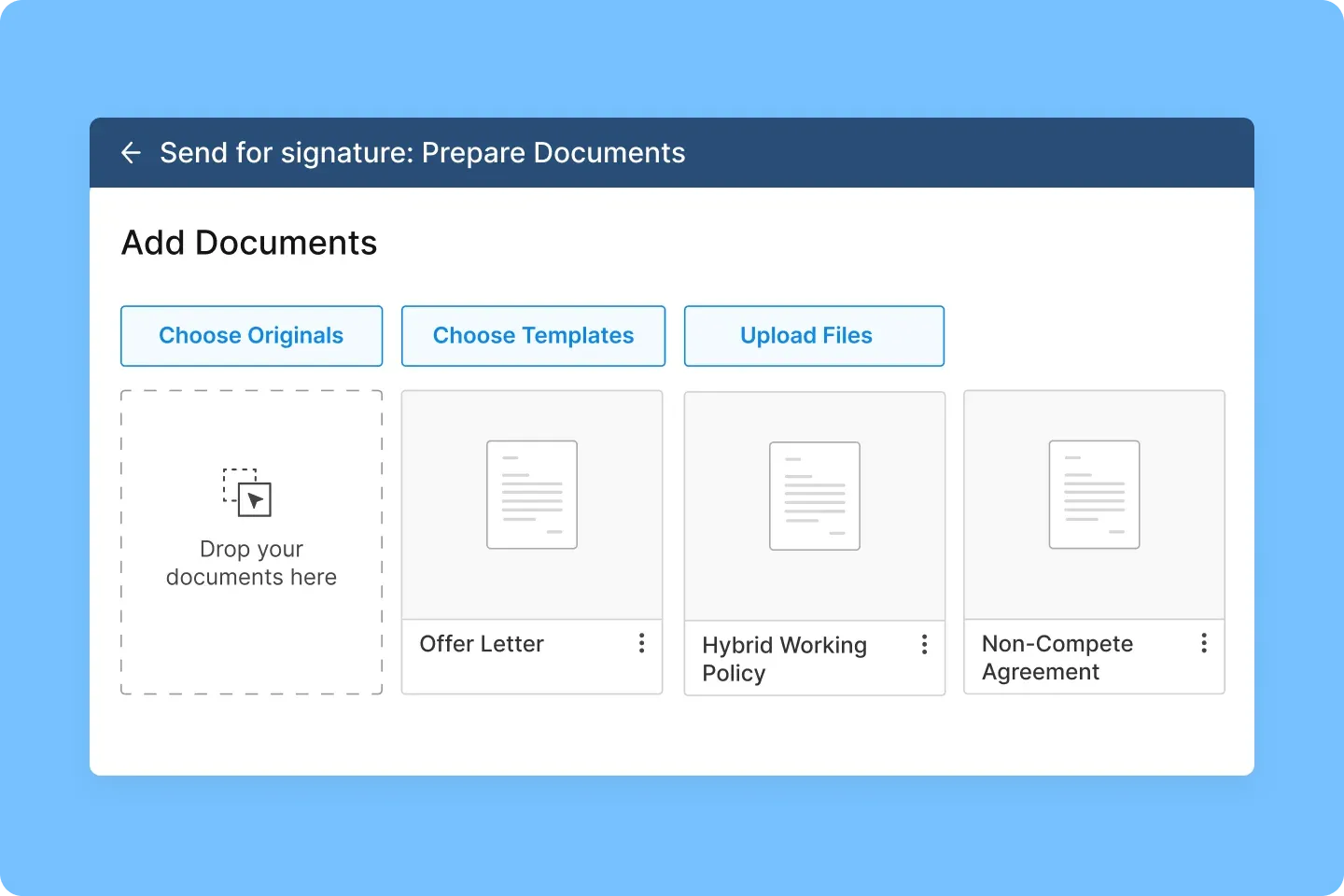
Create clear roles for contract owners, approvers, and administrators while configuring audit trails and retention policies to meet compliance requirements. The platform's mobile-first design drives natural adoption, reducing resistance to change.
- Success metrics (cycle time, compliance flags, searchability)
Track contract turnaround times, which typically improve 70-90% post-migration due to Signeasy's streamlined workflows. Monitor compliance flag resolution and search query success rates.
Teams consistently report better contract findability and faster retrieval compared to their previous Contractbook setup. These metrics validate ROI within the first quarter of deployment.
That brings us to the question of which alternative is better.
How to choose the right Contractbook alternative for your business
Finding the right contract management platform depends on matching your specific workflow needs with each solution's key strengths. With so many options available, here's a streamlined approach to finding your perfect match:
1. Quick decision framework
- If you need fastest deployment and affordable eSign, consider Signeasy.
- If you need enterprise CLM depth, consider Ironclad or Agiloft.
- If you're sales-led with quotes or payments, consider PandaDoc.
- If you want browser-native drafting, consider Juro.
- If Salesforce-first, consider Conga.
For most teams seeking a balance of speed, usability, and enterprise features, Signeasy delivers the strongest combination.
Its quick implementation, transparent pricing, and solid security provide a practical solution for organizations that want immediate results without unnecessary complications.
Next, confirm your shortlisted platform meets these key requirements.
2. Requirements and constraints checklist
Before deciding, align the platform with your business context:
- Must-have features, integrations, security, and data residency
- Internal champions and stakeholders (Legal, Sales, Procurement, IT)
- Budget model, contract volume, regions, and supported languages

Streamlined digital contract signing for efficient workflows
The final step is proving if the software (of your choice) delivers on its promises.
3. Proof-of-concept plan
Validate your shortlist with a structured pilot:
- Run 2–3 sample workflows with KPI targets (cycle time, time-to-sign, admin hours saved)
- Test data migration for templates, metadata, and user permissions
- Review compliance, reporting, and user adoption in the pilot phase
If the pilot delivers results, you’re ready to choose with confidence.
Your contract management tool should adapt to your workflows — not the other way around.
For teams seeking fast rollout, mobile-first usability, and strong value, Signeasy stands out as the most effective of the Contractbook alternatives.
Start your free trial today and see why growing teams choose Signeasy over other Contractbook competitors.




